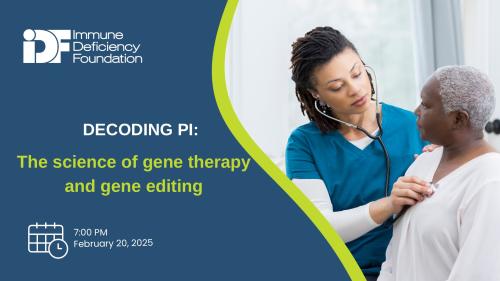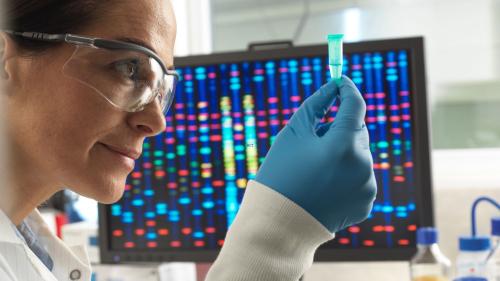
-
Understanding primary immunodeficiency (PI)

Understanding PI
The more you understand about primary immunodeficiency (PI), the better you can live with the disease or support others in your life with PI. Learn more about PI, including the various diagnoses and treatment options.
-
Living with PI
-
Addressing mental health
-
Explaining your diagnosis
- General care
- Get support
- For parents and guardians
-
Managing workplace issues
- Navigating insurance
-
Traveling safely

Living with PI
Living with primary immunodeficiency (PI) can be challenging, but you’re not alone—many people with PI lead full and active lives. With the right support and resources, you can, too.
-
Addressing mental health
-
Get involved

Get involved
Be a hero for those with PI. Change lives by promoting primary immunodeficiency (PI) awareness and taking action in your community through advocacy, donating, volunteering, or fundraising.
-
Advancing research and clinical care
-
Grants
-
IDF surveys
-
Participating in clinical trials
-
Diagnosing PI
-
Consulting immunologist
-
Clinician education

Advancing research and clinical care
Whether you’re a clinician, researcher, or an individual with primary immunodeficiency (PI), IDF has resources to help you advance the field. Get details on surveys, grants, and clinical trials.
-
Grants
State public health laboratories could benefit from making improvements in how they proceed after determining positive newborn screening (NBS) results for severe combined immunodeficiency (SCID), according to a research article in the medical journal Frontiers in Immunology. SCID is characterized by a lack of T cells which leaves babies vulnerable to fatal infections. NBS is crucial for babies with SCID as early diagnosis and treatment saves lives.
Members of the Immune Deficiency Foundation’s SCID Compass team along with the representatives from the Association of Public Health Laboratories (APHL) authored the article, entitled “The Landscape of Severe Combined Immunodeficiency Newborn Screening in the United States in 2020: A Review of Screening Methodologies and Targets, Communication Pathways, and Long-Term Follow-Up Practices.”
Published in October, the article examines the variations in the state lab’s processes for:
- Sharing SCID NBS results with stakeholders including healthcare providers.
- Providing SCID educational materials to both healthcare providers and parents.
- Maintaining a follow-up program to determine outcomes for babies with SCID.
In order to collect the data needed for the article, APHL, in partnership with IDF, surveyed 53 public health NBS system laboratories and follow-up coordinators. The online survey took place between November 2019 and January 2020.
Answers to queries concerning communication pathways showed that while primary care providers and immunologists are commonly notified by NBS programs about out-of-range SCID NBS results, less than half of NBS programs shared results with hospitals, and 16 percent of NBS programs only notified one stakeholder. Increasing the number of healthcare providers notified can improve access to effective counseling and appropriate care over time, stated the article.
“These survey results suggest that there are opportunities to expand notification of results to multiple stakeholders and to perform education to ensure patients are successfully connected to ongoing care,” said the article.
The article also explained that because the addition of SCID to the NBS panel is fairly recent, required of all states as of 2018, deficits in educational materials exist. Suggested avenues to educate providers, parents and the public about SCID include webinars, fact sheets, brochures, newsletters, videos, presentations, conference exhibits, and awareness weeks.
Performing long-term follow-up is also challenging for NBS programs, as the survey showed that less than half of all NBS programs are following patients after they receive a confirmed diagnosis of SCID. Being sure to follow-up with SCID cases provides better outcomes for infants, and helps identify areas in which additional resources are needed. The shortcomings are due to a lack of coordinated efforts and limited funding, explained the article.
The article concluded by offering a comprehensive view of areas that could be improved in SCID NBS.
“This paper reveals opportunities to enhance the SCID NBS system by expanding communication pathways and educational outreach and establishing more formal long-term follow-up. As SCID NBS programs and treatments evolve, continued knowledge dissemination regarding lessons learned will further enable programs like SCID Compass to enhance linkages between families and services and to further elaborate long-term follow-up strategies for infants identified through NBS,” stated the article.
Related resources
Sign up for updates from IDF
Receive news and helpful resources to your cell phone or inbox. You can change or cancel your subscription at any time.





The Immune Deficiency Foundation improves the diagnosis, treatment, and quality of life for every person affected by primary immunodeficiency.
We foster a community that is connected, engaged, and empowered through advocacy, education, and research.
Combined Charity Campaign | CFC# 66309



